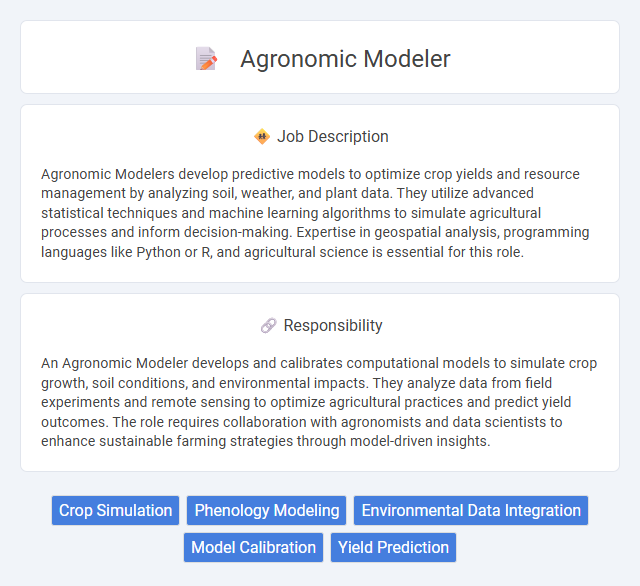
Agronomic Modelers develop predictive models to optimize crop yields and resource management by analyzing soil, weather, and plant data. They utilize advanced statistical techniques and machine learning algorithms to simulate agricultural processes and inform decision-making. Expertise in geospatial analysis, programming languages like Python or R, and agricultural science is essential for this role.
Individuals with strong analytical skills and a passion for agriculture are likely to be well-suited for an Agronomic Modeler role, as it demands precise data interpretation and problem-solving related to crop production. Those comfortable working with advanced computer models and statistical software may have a higher probability of success in this position. Conversely, candidates lacking interest in agronomy or computational analysis might find the job less compatible with their strengths and preferences.
Qualification
A qualified Agronomic Modeler holds an advanced degree in agronomy, agricultural engineering, or related fields, with strong expertise in crop simulation models and data analysis. Proficiency in programming languages such as Python, R, and GIS tools is essential to develop and optimize agronomic models for precision agriculture. Experience with machine learning algorithms, soil-plant-atmosphere interactions, and climate data integration enhances the ability to predict crop yields and improve sustainable farming practices.
Responsibility
An Agronomic Modeler develops and calibrates computational models to simulate crop growth, soil conditions, and environmental impacts. They analyze data from field experiments and remote sensing to optimize agricultural practices and predict yield outcomes. The role requires collaboration with agronomists and data scientists to enhance sustainable farming strategies through model-driven insights.
Benefit
Agronomic Modeler roles likely offer significant benefits, including opportunities to enhance crop yields and optimize resource use through data-driven decision-making. Employees in this position may experience professional growth by working with cutting-edge technologies and contributing to sustainable agricultural practices. Compensation packages might also reflect the specialized expertise required, potentially including competitive salaries and research funding.
Challenge
Agronomic Modeler roles likely involve complex challenges such as integrating diverse datasets to create accurate crop growth simulations. Navigating uncertainties in weather patterns and soil variability may demand advanced statistical and computational skills. This position probably requires continuous adaptation to emerging agricultural technologies and evolving environmental conditions.
Career Advancement
Agronomic Modelers specializing in crop simulation and soil interaction analysis often experience rapid career advancement by leveraging expertise in data-driven decision-making and precision agriculture technologies. Proficiency in statistical modeling, GIS applications, and machine learning algorithms enhances opportunities for leadership roles and collaboration on large-scale agricultural projects. Continuous skill development in remote sensing and climate impact assessment positions Agronomic Modelers as vital contributors to sustainable farming initiatives and innovative agronomic research.
Key Terms
Crop Simulation
Agronomic Modeler specializing in crop simulation develops predictive models to analyze plant growth, yield, and response to environmental variables. Expertise in integrating data from soil, weather, and crop management practices enables optimization of agricultural productivity and resource use efficiency. Proficiency in software such as DSSAT, APSIM, and Python-based modeling tools supports precise simulation and decision-making for sustainable crop management.
Phenology Modeling
Phenology modeling in agronomy involves simulating plant development stages based on environmental factors such as temperature, photoperiod, and soil moisture to optimize crop management and yield predictions. Agronomic modelers use data-driven algorithms and process-based models to forecast phenological events like flowering and maturity, enabling precision agriculture practices. Expertise in remote sensing, climate data integration, and programming languages like Python or R is essential for building accurate, scalable phenological models.
Environmental Data Integration
Agronomic Modelers specialize in integrating environmental data to optimize crop management and improve sustainable agricultural practices. They utilize remote sensing, soil sensors, and climate datasets to develop predictive models for yield forecasting and resource allocation. Proficiency in GIS, data analytics, and crop simulation software enhances their ability to analyze complex environmental variables impacting agricultural productivity.
Model Calibration
Agronomic Modelers specialize in calibrating complex crop and soil models to improve the accuracy of agricultural predictions, enhancing irrigation efficiency and yield forecasts. Calibration involves adjusting model parameters using field data, remote sensing, and climate inputs to align simulations with real-world outcomes. Mastery of tools like DSSAT, APSIM, and machine learning techniques is essential for optimizing model performance in diverse agroecosystems.
Yield Prediction
Agronomic Modelers utilize advanced data analytics and machine learning techniques to predict crop yield with high accuracy. They integrate environmental variables, soil properties, and weather data to optimize agricultural productivity. Their expertise enables precise yield forecasting, supporting sustainable farming decisions and resource management.
 kuljobs.com
kuljobs.com